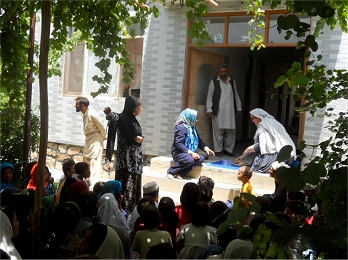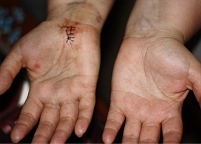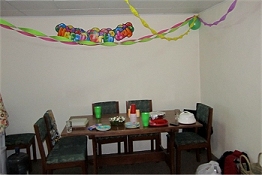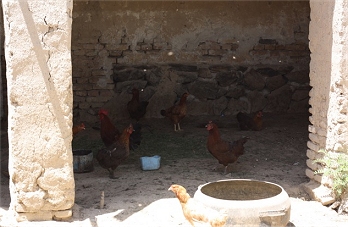|
Charis Around
the World
Tidbits From Ebony
by Elizabeth Carmichael

A role
play about washing hands before eating together as a family,
performed for children under the summer grapevines
at our demonstration garden in the village.
Dear
Charis Family,
 Thanks
for your patience with me since you haven't heard from me since
April!! By that point, I was headed toward a semi-burnout with
everyday life and work in Ebony. Then, at the beginning of
May, I had carpel tunnel surgery on my right hand. I am so
thankful for the opportunity to do that, under the care of an
international hand specialist. He did an amazing job and I have been
completely free from the pain that had not been allowing me to even
sleep anymore. You might think it is a crazy thing to have a
surgery in a third world country, but it only cost me $80 total and
I got to stay and recover in my own house. I am so thankful,
also, that my mom was visiting me at that time! It all just
came together. But, it has taken some time to recover and to
get back on the ball....especially with my "tidbits." Thanks
for your patience with me since you haven't heard from me since
April!! By that point, I was headed toward a semi-burnout with
everyday life and work in Ebony. Then, at the beginning of
May, I had carpel tunnel surgery on my right hand. I am so
thankful for the opportunity to do that, under the care of an
international hand specialist. He did an amazing job and I have been
completely free from the pain that had not been allowing me to even
sleep anymore. You might think it is a crazy thing to have a
surgery in a third world country, but it only cost me $80 total and
I got to stay and recover in my own house. I am so thankful,
also, that my mom was visiting me at that time! It all just
came together. But, it has taken some time to recover and to
get back on the ball....especially with my "tidbits."

Decorations for my birthday party in September.
Back in
April, the five local staff members that I was managing joined me in
starting a regular meeting of community elders in our project
villages. I have come to refer to this group as the "Scary
Lookin' Dudes." If you saw their pictures on the news, you
would NOT think it was in conjunction with positive reports.
Yet, these are the men of my everyday life. The husbands of my
friends. The fathers of the children I love on and snuggle.
It's just who they are. But, I won't deny they can look a bit
scary. :-) We met with them for the past six months and I pray
it will have a positive impact on the project work in their
villages. I won't go into all the details of how all that
works, but I've included a few "tidbits" for you below. (The
stories below were written for an actual, formal report I had to
turn in so if they sound a bit "choppy" that may be the reason.)
Hope you enjoy them. Through the work I've been a part of this
year, and the stories below, I've seen that CHANGE.....life
change.......Kingdom change........is possible even in the most dire
of circumstances. Perhaps it will help to remember that these
stories have occurred in a war torn nation with ongoing conflict.
The men and women are highly UN-educated, find problem solving VERY
difficult, experience death and loss, abuse and poverty constantly.
And, yet, God is giving them glimpses of light. Pray for the
light to shine brightly upon them.
I am now back in the United States for several months, regrouping,
resting and looking ahead to what is next for me. I plan to
return to Ebony, but have a lot of decisions to make before it is
clear what path I will take to continue working there.
MANY blessings,
EC
In the "Tent" village, one of our Community Health Workers, named
"Girlie," was helping a woman who was pregnant. She went to
her house to check on the woman one night, and her labor was not
going well. The woman was in more pain than normal and the
baby didn't seem to be positioned well. Girlie took the woman
to the hospital in another village far away. The doctors there
checked her and said the position of the baby “was not good” and
they could not deliver the baby. The labor was still
progressing and the situation was getting worse. The hospital
staff told the CHW to go to a maternity hospital in the big city.
The CHW took the mother all the way to the other hospital and found
that she would require an operation to deliver. A boy was born
by emergency cesarean. When the CHW took the patient home, the
family made her a very special local food and gave her the
equivalent of $10 as a gift. Our project continues to
encourage CHWs toward volunteerism. However, when the
community members voluntarily acknowledge the value of the CHW help
and the personal cost each CHW pays when they are away from their
own households, helping community members, we see this as a sign of
sustainability and appropriate self-initiative within the community.
Our Community Health Workers, trained through my project, are
modeling love, patient centered and evidence based care in the
community. One night, "Star" went to help a woman who was only
28 weeks pregnant. Star saw that she was bleeding and had
several problems, yet the baby had not reached full term yet.
It was not safe to deliver (especially since there is NO care for
premature infants). Star helped the woman as much as she could,
following her training about how to deal with hemorrhage while
simultaneously preventing miscarriage. Soon, Star decided that
she would take the woman to a hospital. The bleeding worsened
and, when Star and the woman reached the hospital, the doctor was
very encouraged by Star's treatment of the patient. She said,
"I haven't seen a CHW help a patient this much!" Because of
the treatment she received, both the lives of the woman and the baby
were preserved and delivery was prevented until the woman was full
term. She had a home delivery for which Star assisted.
One of our women's groups functions in a community where there is a
family with many problems. The husband and wife are “always
fighting” and all the women in the household fight with each other.
The problems are very apparent to the neighbors and the rest of the
community. Group members report that “every time the husband
is hitting the wife, she ‘escapes’ and runs away to someone else's
house
(a family member).” This family has a daughter. One day,
the husband left with the young daughter and “kidnapped her” to a
neighboring province. In our group, several CHWs thought, "How
can we help this troubled family?" One CHW suggested, "Let's
find one of our children who ‘has a reason to go to their house.’
We will have the child just ask how they are doing." The group
agreed to this action step, also agreeing to the priority of helping
this family within their community. When the child went to the
home, the family told her “many, many stories” about what was going
on and the problems they were facing. Then, the CHWs thought,
"We should work with them and make a self help group among their
women." So, as a result of the help of CHWs, a Self Help Group
(focused on individual/household micro-economic and social
development through collaboration among women) was developed among
the women of this troubled family. The CHW group reports that
the economic improvement and the attention has helped the family
“settle down” quite a bit. The husband has returned with their
daughter. This story has gained the attention of several
community members and is shared as a success story of gentle and
productive community intervention.
A health worker in another group tells this story: “I was at home
alone and a man brought a child to my house. They were very
upset because his child had swallowed gasoline. I saw that the
child was very lethargic and then I said, ‘Let's go very quickly to
a car and then we will go to a hospital.’ I thought I should
give him milk, but then I thought, ‘No, I won't because his throat
is probably closed off and nothing will go down.’" (Note: CHWs
are taught to not give water or milk to a patient who has swallowed
gasoline if the patient is unconscious. The CHW discerned the
difference and used problem solving skills in her treatment
choices.) “When the doctor saw the sickness and what happened,
he pumped the child’s stomach. Then the child vomited and was
OK after a while. The family told me that they are so happy
that he is OK and that my response to them was very fast.”
In a very remote place there are four young boys who “can’t see at
night.” Our project women's group reports that “when night
comes, the whole family knows that the boys will not be able to
see.” This is a significant problem anywhere in the world, but
most especially for boys who live in a household where they are
expected to help with chores, or need to walk back and forth outside
to use a latrine, wash themselves or visit the mosque for prayers.
The Community Health Worker, Rina, said, "I should take these
children to the eye doctors who come once a month to the bigger
village." (She was referring to the Eye Camps which have
increased to once per week since September.) When she took
them to the eye doctors, the boys were given vitamin A capsule and
some medicine that no one else had ever given the family.
Having learned about nutrition in her classes, the CHW stopped on
the way home and bought some vegetables and to give to the family.
(She bought groceries that she knew to be especially helpful for eye
health. This was a significant gift from her, as she is a
widow with two children of her own.) The CHW taught the family
some lessons about eye health, nutrition and how to administer their
new medications. Currently, the family reports that the boys
have improved so much that they can go to the bathroom themselves at
night and can see a bit. The family says, “My sons are
healed!”
At a women's group called "Light," many of the poor people have
problems with eye health. Many people have cataracts, which in
local language are called “curtains.” The CHW group said to
these kinds of people, "We know a good eye hospital and where it is.
They help us a lot." The CHWs had learned about a famous Eye
Hospital through the monthly eye clinic program at the village
clinic, a program initiated after CHW groups in our project groups
identified eye health as a major problem within the community.
(Identifying community felt and real needs is a major goal of the
our project.) The CHW took the old widow, who has no other
person to help or care for her, to the eye hospital. Now the
woman has had cataract removal surgery and proper follow up.
As a result of this story, many people know that this was with the
help of the local CHW.
One day a man came to the garden and said to Mr. Sib (our project
agriculturalist), “Everyone in our household has a problem with the
trees they are trying to grow. They are all sick.” Our
staff member went to the house for a consultation and found that the
trees had a problem that could be solved with the tobacco solution—a
recipe taught to CHWs in their agricultural training. One CHW
in particular, who lives quite near the man with the problem, is a
specialist when it comes to carrying for tree diseases. As a
reward for helping our project staff to train new CHW groups further
from the clinic area, she received a “medicine pump” to use for
spraying her garden. She often takes her pump to houses within
the community, helping them spray for and care for their trees and
other plants. Because the CHW did not have permission to visit
the home of this male community member, she gave him clear
instructions about how to make his own tobacco solution and apply it
to the trees. The man reports that the trees are now health
and his family is very happy. Fruit has come to every tree
that was sick.
Through the meetings of community elders, our project staff
(especially the male community facilitator) have helped community
leaders address key social issues that community members are facing.
Our staff also seek to emphasize important character and leadership
traits. During one meeting, "Chase" reiterated some social training
he had received regarding reflecting on past pain and learning from
problems. He recited for the group of CHWs and community
elders a poem that has had a powerful impact on his life.
Through his personal story, his intentionality to address this
issue, and his articulations of character lessons he had studied
through the week, the group learned from Chaman the importance of
small, consistent choices to display a character that is
“life/energy giving” to others rather than “life/energy taking.”
This poem about peace is the one the leaders responded very
positively to. Despite what might be portrayed in the news
sometimes, the majority of the population longs for peace and health
for their men, women and children.
The smiles
My smiles all changed to weeping (without you), when will you come?
My days all changed to dark nights (without you), when will you
come?
All the mountains are lying down; the ripples of the rivers are
burning
Our springs became all full of Thorns, when will you come?
The heads do not look good without turbans (a cultural expression of
prosperity and leadership)
Look to the heads, all are without hat, when will you come?
There is no bracelet's shaking sound, all the sounds are from
handcuffs
Our Deras(1) are getting empty of our guests, when will you come?
(1) An open area usually in the gardens and local people use it as
place of meeting their guests, or only men sit there for chatting
and tea drinking.

Have you ever seen one of these guys without their head on?
That is how I have felt for the past six months!
Our International Charis
Family
Your stories from around the world touch us and we pray for your
safety.
Thanks, Love and Blessings to every one of you!

'Behold, I will bring them from the north country, And gather them
from the ends of the earth,
Among them the blind and the lame,
The woman with child and The one who labors with child, together,
A
great throng shall return there...And My people shall be satisfied with My goodness, says the LORD.'
Jeremiah 31:8, 14
~~~
©2011 Charis Childbirth
Services, All Rights Reserved
Feel free to forward this newsletter to friends in its entirety,
leaving all attribution intact.
October 2011
|